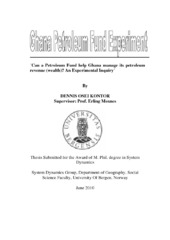Ghana Petroleum Fund Experiment. ´Can a Petroleum Fund help Ghana manage its petroleum revenue (wealth)? An Experimental Inquiry´
| dc.contributor.author | Osei Kontor, Dennis | eng |
| dc.date.accessioned | 2010-11-09T08:10:58Z | |
| dc.date.available | 2010-11-09T08:10:58Z | |
| dc.date.issued | 2010 | eng |
| dc.identifier.uri | https://hdl.handle.net/1956/4306 | |
| dc.description.abstract | Ghana starts petroleum production and export business in the third quarter of2010. The management of the petroleum tax revenue is seen as timely fiscalpolicy decisions by the government and its partners. These policy decisions couldeither lead to a “blessing”; managing the revenue well or a “curse”; mismanagingthe revenue, if right decisions are not taken. Studies also show that peoplecommonly misperceive the dynamics of a system when making decisions,resulting to poor outcomes of their decisions.The following hypotheses were made: first, policy makers in Ghana willmismanage its petroleum tax revenue through a Fund- ‘curse’. Second, policymakers will misperceive the dynamics of a petroleum economy while makingspending decisions. Third, misperceptions lead to a cyclical development of thetotal capacity utilisation.A system dynamics model-based experiment was carried out in Ghana to testthese hypotheses. The model behind the experiment captured a simplemacroeconomic dynamics of a petroleum economy, which shares some essentialfeatures of Ghana’s economy. The experiment was supported with administeringof questionnaire, interviews and field data. Selected policy makers from the Bankof Ghana, Ministry of Finance and Economic Planning and the ParliamentaryCommittee on Finance formed the subjects of the experiments.The experimental output indicates a potential for policy makers in Ghanamanaging its petroleum tax revenue well through a Petroleum Fund. Most policymakers seemed to have based their spending decisions on the Fund inflows,leading to misperceptions of the dynamics of the petroleum economy. Thiscreated a cyclical development of the total capacity utilisation and other economicindicators. It is recommended that, a Petroleum Fund is established in Ghana witha strong fiscal policy and a discipline commitment attached to its management. | en_US |
| dc.language.iso | eng | eng |
| dc.publisher | The University of Bergen | eng |
| dc.subject | Ghana Petroleum Fund | eng |
| dc.subject | Petroleum Tax Revenue | eng |
| dc.subject | System dynamics | eng |
| dc.subject | Public Spending | eng |
| dc.subject | Total Capacity Utilisation | eng |
| dc.subject | Misperceptions | eng |
| dc.title | Ghana Petroleum Fund Experiment. ´Can a Petroleum Fund help Ghana manage its petroleum revenue (wealth)? An Experimental Inquiry´ | eng |
| dc.type | Master thesis | en_US |
| dc.rights.holder | The author | en_US |
| dc.rights.holder | Copyright the author. All rights reserved | en_US |
| dc.description.localcode | GEO-SD350 | |
| dc.description.localcode | MASV-SYSDY | |
| dc.subject.nsi | VDP::Matematikk og Naturvitenskap: 400::Geofag: 450::Petroleumsgeologi og -geofysikk: 464 | nob |
| fs.subjectcode | GEO-SD350 |
Tilhørende fil(er)
Denne innførselen finnes i følgende samling(er)
-
Department of Geography [676]
